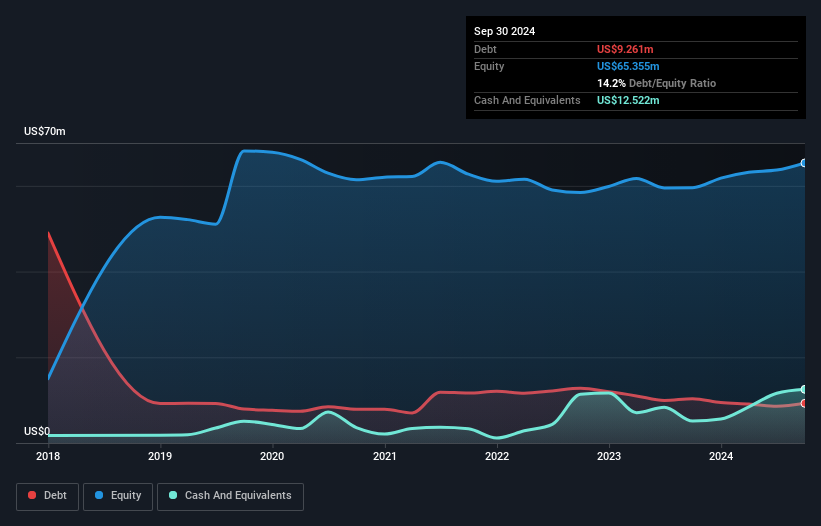Please use a PC Browser to access Register-Tadawul
Is Stabilis Solutions (NASDAQ:SLNG) Using Too Much Debt?
Stabilis Solutions, Inc. SLNG | 5.11 | +3.96% |
David Iben put it well when he said, 'Volatility is not a risk we care about. What we care about is avoiding the permanent loss of capital.' When we think about how risky a company is, we always like to look at its use of debt, since debt overload can lead to ruin. As with many other companies Stabilis Solutions, Inc. (NASDAQ:SLNG) makes use of debt. But is this debt a concern to shareholders?
Why Does Debt Bring Risk?
Debt assists a business until the business has trouble paying it off, either with new capital or with free cash flow. In the worst case scenario, a company can go bankrupt if it cannot pay its creditors. However, a more frequent (but still costly) occurrence is where a company must issue shares at bargain-basement prices, permanently diluting shareholders, just to shore up its balance sheet. Of course, debt can be an important tool in businesses, particularly capital heavy businesses. The first thing to do when considering how much debt a business uses is to look at its cash and debt together.
What Is Stabilis Solutions's Debt?
You can click the graphic below for the historical numbers, but it shows that Stabilis Solutions had US$9.26m of debt in September 2024, down from US$10.3m, one year before. However, it does have US$12.5m in cash offsetting this, leading to net cash of US$3.26m.

How Strong Is Stabilis Solutions' Balance Sheet?
We can see from the most recent balance sheet that Stabilis Solutions had liabilities of US$16.5m falling due within a year, and liabilities of US$7.47m due beyond that. Offsetting this, it had US$12.5m in cash and US$5.95m in receivables that were due within 12 months. So it has liabilities totalling US$5.52m more than its cash and near-term receivables, combined.
Given Stabilis Solutions has a market capitalization of US$141.2m, it's hard to believe these liabilities pose much threat. However, we do think it is worth keeping an eye on its balance sheet strength, as it may change over time. Despite its noteworthy liabilities, Stabilis Solutions boasts net cash, so it's fair to say it does not have a heavy debt load!
It was also good to see that despite losing money on the EBIT line last year, Stabilis Solutions turned things around in the last 12 months, delivering and EBIT of US$2.4m. When analysing debt levels, the balance sheet is the obvious place to start. But ultimately the future profitability of the business will decide if Stabilis Solutions can strengthen its balance sheet over time. So if you want to see what the professionals think, you might find this free report on analyst profit forecasts to be interesting.
But our final consideration is also important, because a company cannot pay debt with paper profits; it needs cold hard cash. While Stabilis Solutions has net cash on its balance sheet, it's still worth taking a look at its ability to convert earnings before interest and tax (EBIT) to free cash flow, to help us understand how quickly it is building (or eroding) that cash balance. Over the last year, Stabilis Solutions actually produced more free cash flow than EBIT. That sort of strong cash conversion gets us as excited as the crowd when the beat drops at a Daft Punk concert.
Summing Up
We could understand if investors are concerned about Stabilis Solutions's liabilities, but we can be reassured by the fact it has has net cash of US$3.26m. And it impressed us with free cash flow of US$8.0m, being 339% of its EBIT. So is Stabilis Solutions's debt a risk? It doesn't seem so to us. There's no doubt that we learn most about debt from the balance sheet. But ultimately, every company can contain risks that exist outside of the balance sheet. For example Stabilis Solutions has 2 warning signs (and 1 which is significant) we think you should know about.
This article by Simply Wall St is general in nature. We provide commentary based on historical data and analyst forecasts only using an unbiased methodology and our articles are not intended to be financial advice. It does not constitute a recommendation to buy or sell any stock, and does not take account of your objectives, or your financial situation. We aim to bring you long-term focused analysis driven by fundamental data. Note that our analysis may not factor in the latest price-sensitive company announcements or qualitative material. Simply Wall St has no position in any stocks mentioned.



